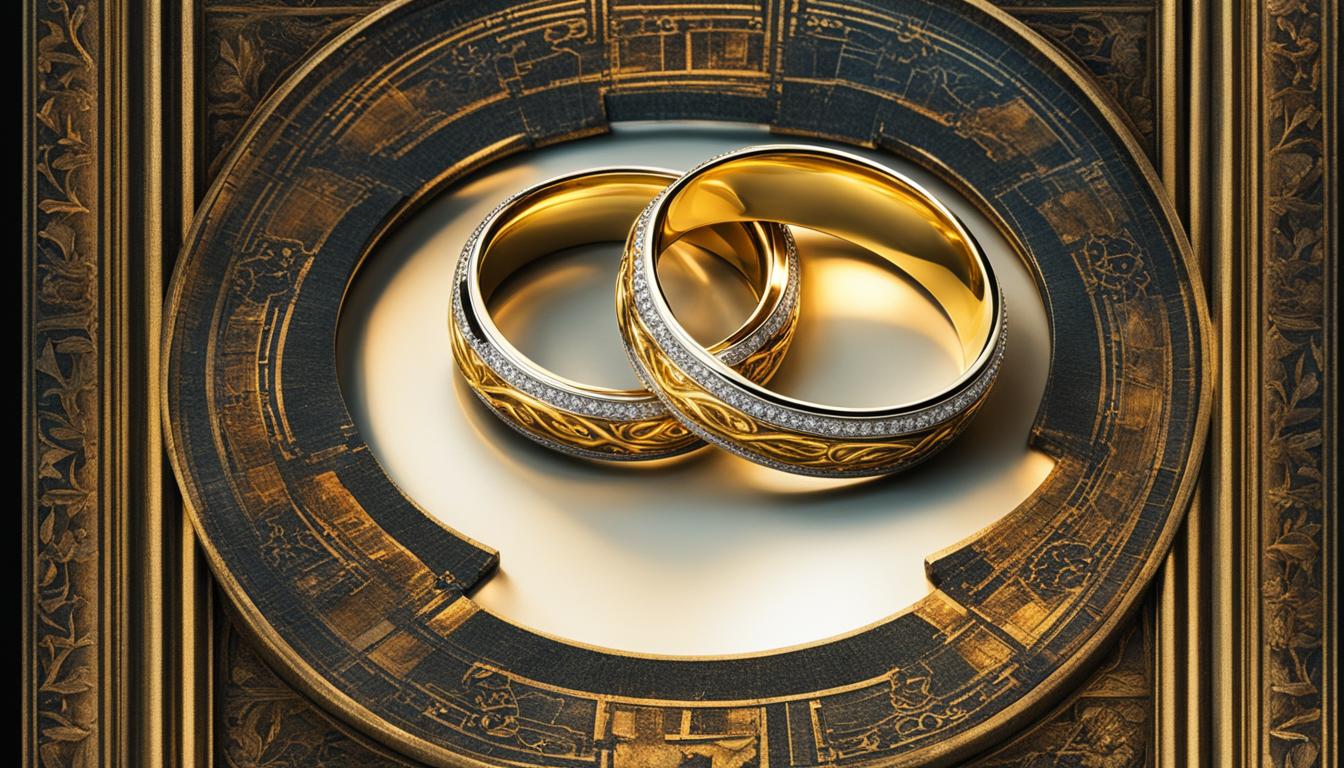Wedding rings hold a special place in the hearts of couples, symbolizing their love and commitment to each other. However, as with any tradition, there are many beliefs and superstitions surrounding wedding rings. One of the most common questions that couples ask is whether changing their wedding ring is considered bad luck. In this article, we will delve into this topic and explore various wedding ring traditions and beliefs, helping couples make an informed decision about their wedding rings.
Key Takeaways:
- Wedding rings hold deep symbolism and meaning for couples, but there are many superstitions and beliefs surrounding them.
- The question of whether changing your wedding ring is bad luck is subjective and rooted in personal beliefs and traditions.
- Couples should find a balance between honoring cultural customs and following their individual desires when considering changing their wedding rings.
- Alternative options, such as redesigning or upgrading the wedding ring, may also be considered.
- The emotional attachment and sentimental value of a wedding ring can influence the decision to change or preserve it.
Wedding Ring Superstitions and Traditions
Wedding ring superstitions and customs date back centuries and vary across cultures. Here are some popular beliefs:
| Superstition/Custom | Significance |
|---|---|
| Wearing the ring on the fourth finger of the left hand | Believed to originate from ancient Egyptian culture, which believed that the “vein of love” ran through this finger, directly to the heart. |
| Never taking the wedding ring off | Symbolizes unending love and commitment, and removing the ring could be a sign of infidelity or a lack of devotion. |
| Passing down wedding rings as family heirlooms | Represents continuity, tradition, and a connection to family roots. It’s also a symbol of passing on the love and commitment of the couple to future generations. |
| Using a family member’s wedding ring | Believed to bring good luck, as the ring has been passed down through previous successful marriages. It also symbolizes the merging of two families. |
| Burying the wedding ring | Indicates a desire for eternal love and commitment. Some cultures believe that burying the wedding ring will bring good luck or ward off evil spirits. |
These are just a few examples of the many wedding ring customs and superstitions that exist. While they may seem outdated or irrational to some, they hold significant meaning and significance for others.
The Significance of Wedding Rings
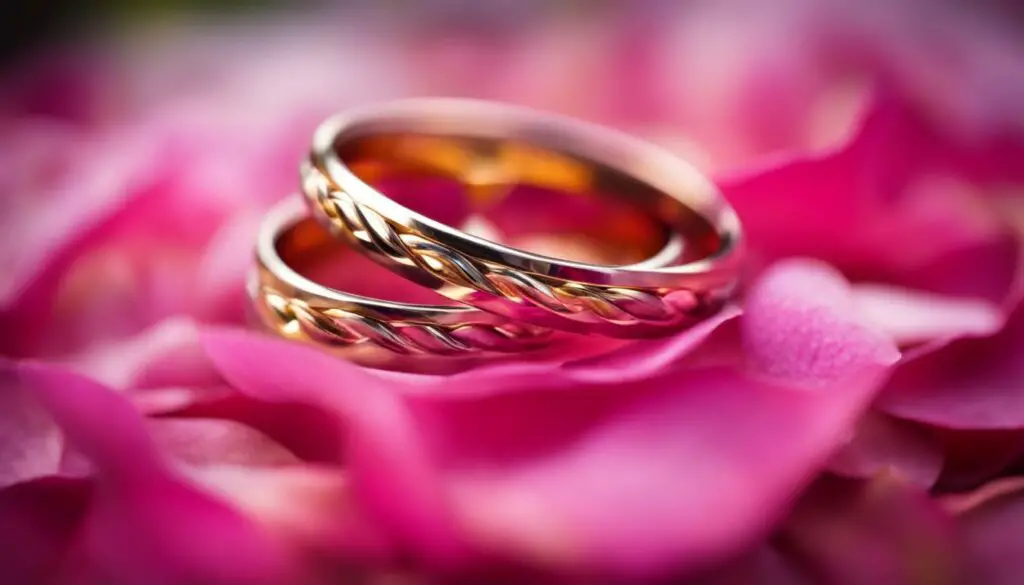
Wedding rings are more than just a piece of jewelry, they are a symbolic representation of eternal love and commitment. The tradition of wearing wedding rings dates back centuries, with various interpretations and customs across different cultures and religions.
In Christianity, the circular shape of the ring represents eternity and endless love, while the space in the center signifies the couple’s journey together as one. In Jewish traditions, the ring is given by the groom to the bride, and it symbolizes the unbroken circle of love and commitment. Hindu weddings have a different take on wedding rings, where the groom ties a thali, a sacred necklace, around the bride’s neck, signifying their union.
These cultural traditions and meanings behind wedding rings highlight the significance and value they hold for couples. Changing a wedding ring can be seen as a break in tradition, potentially causing anxiety or worry over disrupting the symbolic meaning of the ring. However, it is important to remember that the symbolism of the ring doesn’t necessarily disappear with a change in the physical ring itself.
At the end of the day, it is up to each couple to decide what holds significance for them. While many may feel a strong attachment to their wedding rings and adhere to certain beliefs about changing them, others may view it as a personal choice and preference. Ultimately, the true significance of wedding rings lies in the love and commitment they represent.
Debunking the Myth: Is Changing Your Wedding Ring Bad Luck?
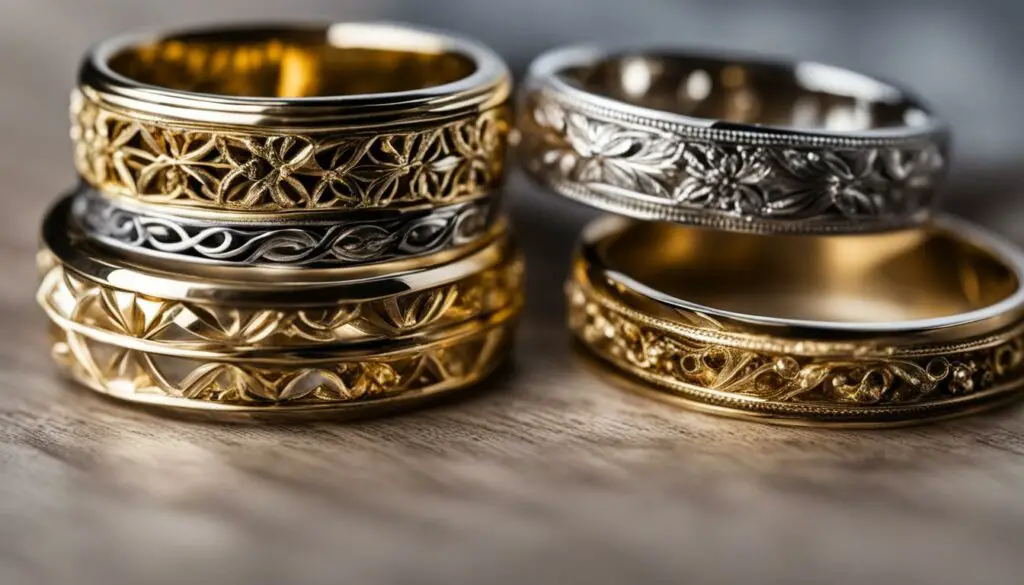
Many people believe that changing your wedding ring is bad luck. Some even go as far as to say that it can lead to the end of your marriage. But is there any truth to this superstition?
Let’s explore some of the most common changing wedding ring superstitions:
- It is believed that removing your wedding ring can break the circle of love and commitment you made with your partner.
- Changing your wedding ring is seen as a sign of dissatisfaction or restlessness in your marriage.
- Some people believe that the wedding ring carries the energy of the marriage, and by changing it, you are disrupting that energy.
While these beliefs may hold some weight for certain individuals, there is no real evidence to support them. In fact, changing your wedding ring can have many positive benefits.
For example, some couples may choose to upgrade their wedding rings as a way to celebrate a significant milestone in their relationship or as a symbol of their renewed commitment to each other. Similarly, some may choose to redesign their rings to reflect their evolving tastes and preferences.
Ultimately, the decision to change your wedding ring is a personal one that shouldn’t be influenced by superstitions or traditional beliefs. As long as both partners agree, there should be no negative consequences associated with changing your wedding ring.
“Changing your wedding ring is a personal decision that shouldn’t be influenced by superstitions or traditional beliefs.”
It’s important to remember that your wedding ring is a reflection of your love and commitment to your partner. Whether you choose to keep it the same or change it, the most important thing is that it holds deep meaning and significance to you both.
Personal Preferences and Individual Beliefs
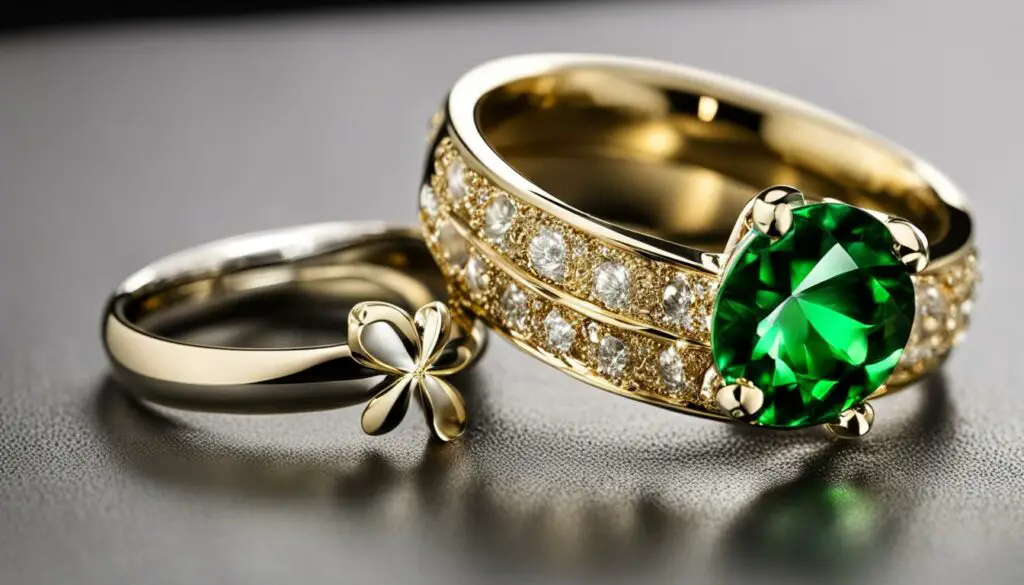
When it comes to changing wedding rings, personal preferences and individual beliefs are significant factors to consider. Some people may view it as a way to refresh their commitment and mark a new phase in their relationship, while others may adhere strongly to traditional superstitions.
Superstitious beliefs about wedding rings vary widely across cultures and even among different individuals. Some believe that removing the wedding ring for any reason could lead to negative consequences or even signify the end of the marriage. Others see changing the ring as an opportunity to update or upgrade their symbol of love.
“My grandmother always told me that I should never change my wedding ring or else I’d be inviting bad luck into my marriage. But my husband and I decided to upgrade our rings for our 10th anniversary, and it felt like a renewal of our love and commitment.”
With such diverse beliefs and attitudes towards wedding rings, it is important for each couple to explore and understand their own values and desires. This can involve discussions about the significance of the ring in their relationship and whether there are any cultural or family traditions that they wish to honor.
Ultimately, the decision to change or maintain a wedding ring should reflect each individual’s beliefs and personal preferences. While it can be tempting to cling to traditional superstitions or follow what others expect, it is essential that couples choose a path that feels authentic and meaningful to them.
Balancing Tradition and Personal Choice
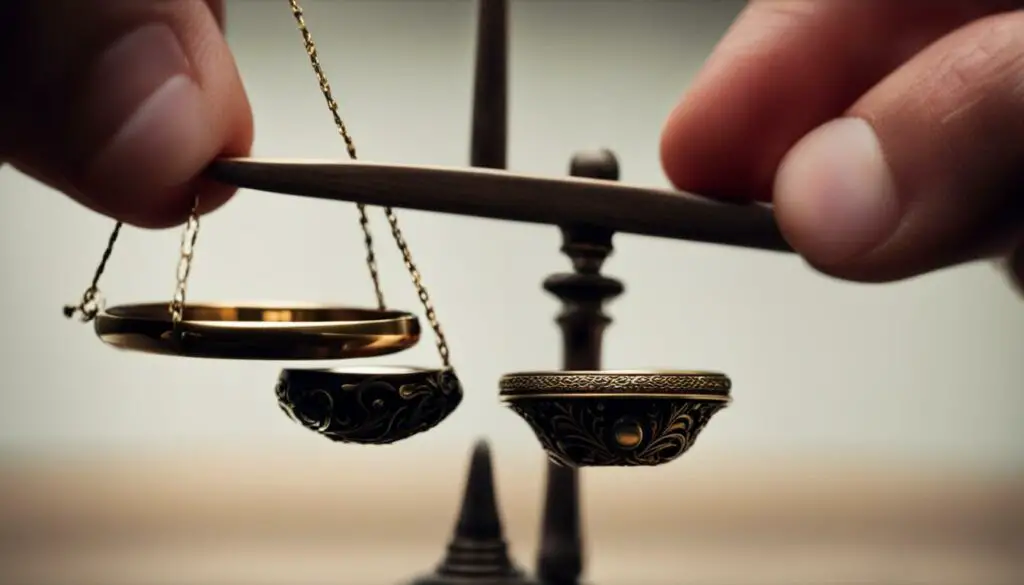
When it comes to changing wedding rings, couples must balance tradition and personal choice. While some adhere strongly to wedding ring customs and superstitions, others may view changing the ring as a way to refresh their commitment. Ultimately, the decision should align with the couple’s beliefs and values, but it’s essential to understand the potential consequences of changing a wedding ring.
For many, wedding rings hold significant sentimental value. They may represent cherished memories and milestones in a couple’s relationship, and changing them may feel like erasing those memories. It’s essential to recognize the emotional attachment to wedding rings and consider preserving them in some way. Redesigning or upgrading the rings can be a viable alternative that still honors the symbolism of the wedding ring but personalized to the couple’s present desires.
However, some may believe that changing the wedding ring may bring bad luck, and sticking to tradition can avoid this situation. Each couple should evaluate their beliefs about changing wedding rings and its potential impact on their relationship.
Changing a wedding ring is a deeply personal decision. It’s important to find a balance between respecting cultural traditions and following individual desires.
Understanding the Emotional Attachment to Wedding Rings
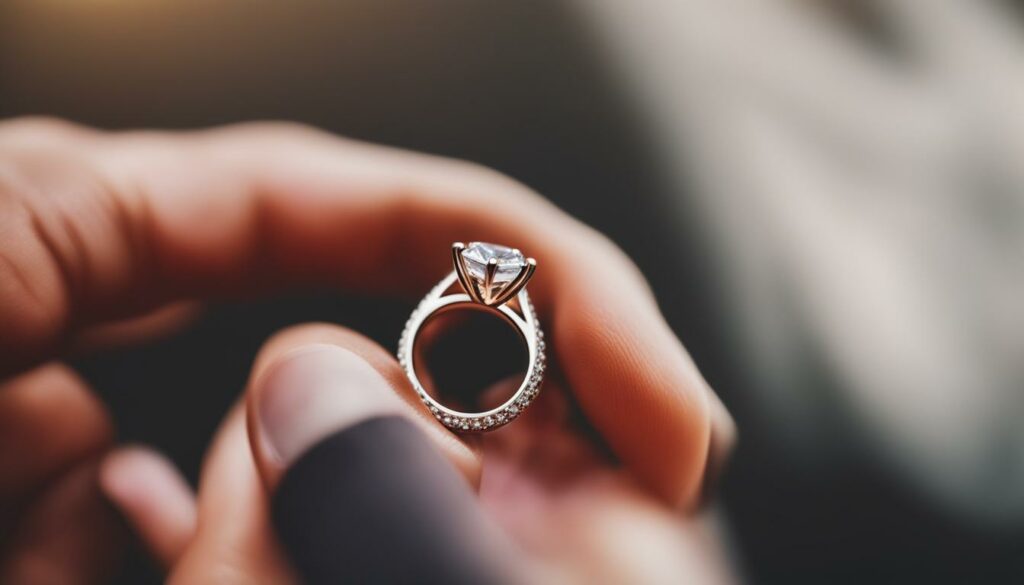
Wedding rings are more than just pieces of jewelry. They hold sentimental value and emotional attachment for many couples. These rings often represent a physical manifestation of a couple’s love and commitment, serving as a daily reminder of the vows they made on their wedding day.
For some, the wedding ring may represent a significant milestone in their relationship. Perhaps it was the first piece of jewelry that their partner ever gave them, or maybe it was the symbol of their engagement. Whatever the case may be, the emotional attachment to the wedding ring is deeply personal and unique to each couple.
“My husband gave me his grandmother’s wedding ring when we got married. It is a family heirloom, and I wear it with pride. I don’t think I could ever change it because it holds so much sentimental value.” – Sarah, 34
However, even with such strong emotional connections, some couples may still consider changing their wedding rings for various reasons, such as upgrading to a more luxurious ring or needing a different style due to finger size changes.
While changing the wedding ring may be practical, it can also be a difficult decision to make. The thought of letting go of the sentimental value attached to the original ring can be daunting, but it is important to remember that the emotional connection does not necessarily have to be lost if the couple chooses to change their ring.
Whether it’s through upgrading the same ring, wearing the original ring on a different finger, or incorporating the original ring into a new design, there are various ways to maintain the emotional attachment while still making changes to the ring.
Ultimately, the decision to change or keep the wedding ring is a highly personal one, and each couple should do what feels right for them. Understanding the emotional attachment to the wedding ring can help couples navigate this decision with care and consideration.
Exploring Alternatives: Redesigning or Upgrading Wedding Rings
For those who feel uneasy about changing their wedding rings due to superstitions or traditions, redesigning or upgrading the rings can be a great alternative that still allows for personalization and a renewed commitment.
Redesigning a wedding ring can involve adding or removing stones, changing the metal, or altering the design to better suit a couple’s evolving taste and style. This process can breathe new life into the ring without completely replacing it, and it can represent a new chapter in the couple’s relationship.
Upgrading the wedding ring involves replacing it with a more valuable or meaningful ring, such as a larger diamond or incorporating a family heirloom. This can also signify a new level of commitment and can be a way to honor the past while looking towards the future.
It is important to remember that while redesigning or upgrading the wedding ring may not be as taboo as completely changing it, some superstitions and beliefs may still exist. For example, some believe that removing a stone from the original ring can bring bad luck or that upgrading the ring is a sign of discontent in the marriage. However, personal preferences and beliefs should always guide the decision-making process, and couples should choose the path that feels authentic and meaningful to them.
“A ring can be a symbol of love and commitment, but it’s the love and commitment itself that’s important, not the ring.”
Conclusion
The decision to change your wedding ring is a personal one that is deeply rooted in beliefs and traditions surrounding this symbolic piece of jewelry. While there are many superstitions and customs associated with wedding rings, there is no one-size-fits-all answer to whether changing it is bad luck or not.
By understanding the significance of wedding rings and exploring alternative options such as redesigning or upgrading, couples can make a decision that aligns with their values and desires. It is crucial to strike a balance between tradition and personal choice and to remember the emotional attachment that comes with this symbol of love and commitment.
Ultimately, each couple should make the decision that feels right for them and their relationship. Whether you choose to preserve your original ring or change it up, the most important thing is to create a meaningful symbol of your love that reflects your shared values and commitment to one another.
Thank you for exploring the various wedding ring traditions and beliefs about changing wedding rings. We hope that this article has provided valuable insights and helped you navigate this important decision with confidence.
FAQ
Is it bad luck to change your wedding ring?
The belief that changing your wedding ring brings bad luck is subjective and rooted in personal beliefs and traditions. There is no universal answer, and it ultimately depends on what feels right for each couple.
What are some wedding ring superstitions and traditions?
Wedding ring superstitions and traditions vary across cultures and include wearing the ring on a specific finger, performing rituals during the wedding ceremony, and even passing down family heirloom rings.
What is the significance of wedding rings?
Wedding rings symbolize eternal love and commitment between couples. They hold deep meaning and are often seen as a representation of the bond shared by the partners.
Is changing your wedding ring really bad luck?
The idea that changing your wedding ring brings bad luck is a myth. There is no solid evidence to support this superstition, and it ultimately comes down to personal beliefs and preferences.
How do personal preferences and individual beliefs affect changing wedding rings?
Personal preferences and individual beliefs greatly influence the decision to change wedding rings. Some people may view it as a way to refresh their commitment, while others may adhere strongly to traditional beliefs and superstitions.
How can couples balance tradition and personal choice when considering changing their wedding ring?
It’s important for couples to find a balance between honoring cultural traditions and respecting their own desires. This can be achieved by exploring alternatives such as redesigning or upgrading the wedding ring.
How does emotional attachment to wedding rings impact the decision to change them?
Wedding rings often hold sentimental value and emotional attachment. Couples may consider the memories and milestones associated with their rings when deciding whether to change or preserve them.
Are there alternatives to changing wedding rings?
Yes, couples who believe changing their wedding ring brings bad luck can explore alternatives such as redesigning or upgrading their rings. This allows them to maintain the symbol of their love while making a change that feels right for them.
What is the conclusion regarding changing wedding rings?
The question of whether it is bad luck to change your wedding ring is subjective. Couples should decide based on their own values and desires, taking into account superstitions, traditions, and emotional attachments associated with wedding rings.
